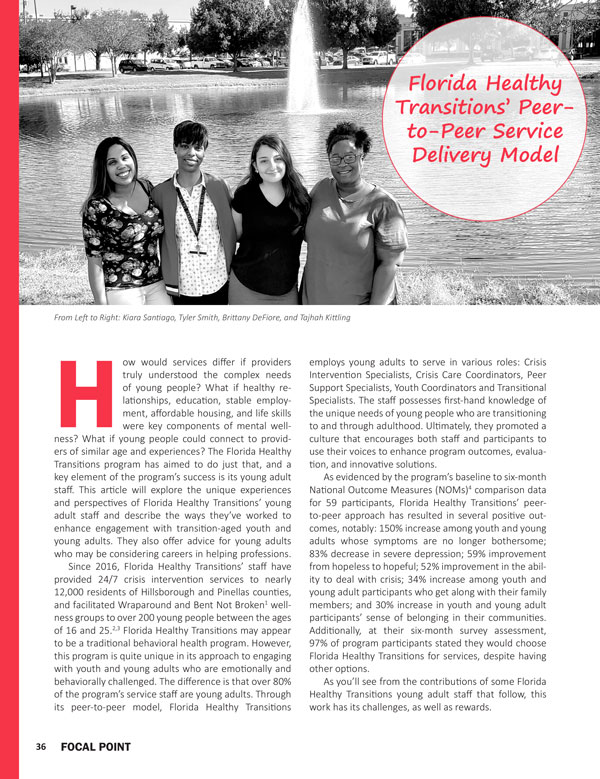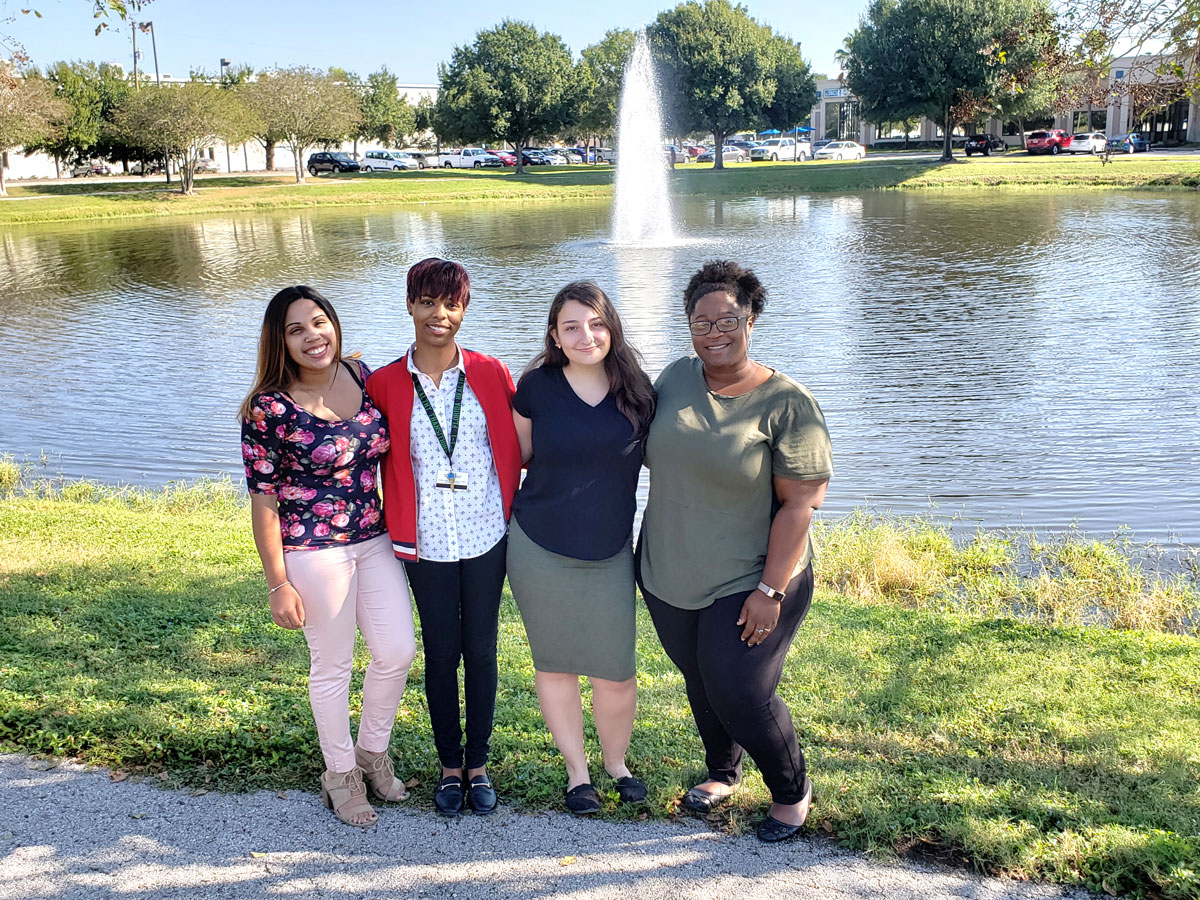
Abstract: Florida's Healthy Transitions team utilizes a peer-to-peer model to decrease program participants' mental health symptoms and increase their sense of community belonging. The article includes contributions from some of the young adults working in the program on the rewards and challenges of their work.
"Florida Healthy Transitions’ Peer-to-Peer Service Delivery Model" (2019)
Brittany DeFiore, Tyler Smith, Tajhah Kittling, Kiara Santiago, Tonicia Freeman-Foster, & Barbara Morrison-Rodriguez
How would services differ if providers truly understood the complex needs of young people? What if healthy relationships, education, stable employment, affordable housing, and life skills were key components of mental wellness? What if young people could connect to providers of similar age and experiences? The Florida Healthy Transitions program has aimed to do just that, and a key element of the program's success is its young adult staff. This article will explore the unique experiences and perspectives of Florida Healthy Transitions' young adult staff and describe the ways they've worked to enhance engagement with transition-aged youth and young adults. They also offer advice for young adults who may be considering careers in helping professions.
Since 2016, Florida Healthy Transitions' staff have provided 24/7 crisis intervention services to nearly 12,000 residents of Hillsborough and Pinellas counties, and facilitated Wraparound and Bent Not Broken1 wellness groups to over 200 young people between the ages of 16 and 25.2,3 Florida Healthy Transitions may appear to be a traditional behavioral health program. However, this program is quite unique in its approach to engaging with youth and young adults who are emotionally and behaviorally challenged. The difference is that over 80% of the program's service staff are young adults. Through its peer-to-peer model, Florida Healthy Transitions employs young adults to serve in various roles: Crisis Intervention Specialists, Crisis Care Coordinators, Peer Support Specialists, Youth Coordinators and Transitional Specialists. The staff possess first-hand knowledge of the unique needs of young people who are transitioning to and through adulthood. Ultimately, they promoted a culture that encourages both staff and participants to use their voices to enhance program outcomes, evaluation, and innovative solutions.
As evidenced by the program's baseline to six-month National Outcome Measures (NOMs)4 comparison data for 59 participants, Florida Healthy Transitions' peer-to-peer approach has resulted in several positive outcomes, notably: 150% increase among youth and young adults whose symptoms are no longer bothersome; 83% decrease in severe depression; 59% improvement from hopeless to hopeful; 52% improvement in the ability to deal with crisis; 34% increase among youth and young adult participants who get along with their family members; and 30% increase in youth and young adult participants' sense of belonging in their communities. Additionally, at their six-month survey assessment, 97% of program participants stated they would choose Florida Healthy Transitions for services, despite having other options.
As you'll see from the contributions of some Florida Healthy Transitions young adult staff that follow, this work has its challenges, as well as rewards.
Perspectives from Florida Healthy Transitions Peer Staff

From Left to Right: Kiara Santiago, Tyler Smith, Brittany DeFiore, and Tajhah Kittling
Tyler Smith – Youth Coordinator
Growing up, I felt like my life would always be limited to what I could and "could not" do. Constantly battling anxiety, depression, and managing a diagnosis that I didn't fully understand, I struggled to connect with others because I felt like an outcast. It wasn't until I took full responsibility for my mental health and went through therapy/support groups that I realized my symptoms were completely manageable. My personal experience with mental health inspired me to want to make a change in the social services industry. I later graduated from the University of Central Florida with a bachelor's degree in Psychology. I'm grateful that I'm in a position where I can use both lived experiences and a degree to better serve our communities in need.
There are challenges that I've faced as a Youth Coordinator. The job requires wearing multiple hats and sometimes there's a struggle navigating, defining, and coping with those roles. When operating as a peer, you're given the freedom to use your personal experiences to help support participants and allow them to see that their diagnosis is manageable. I believe that having peers in positions like this is important to help reduce the stigma that is associated with mental illness, but there need to be adequate support systems in place to allow peers to release the emotional baggage that comes with the role.
Brittany DeFiore – Youth Coordinator
Throughout my life, I looked at my lived experience as a burden; something that held me back, something that stole life from me, something I was going to have to hide if I ever wanted to be successful. When I joined Healthy Transitions, my lived experience was embraced. My lived experience has made me more empathic and understanding, as I know what it feels like to be misunderstood and unheard. I see the world differently because of who I am.
This job has given me the opportunity to grow professionally, but also personally. When I first started, I struggled a lot with sharing my story. I don't think I was ready to put myself out there, and I didn't understand the best way to help people through my lived experience. Since I nervously began this job, I've become more comfortable in sharing my story. I see the impact it has on the young adults I work with, and that has inspired me to continue in my journey of openness and advocacy. This job has changed my life for the better, but I had to trust myself a little to get here. My biggest piece of advice is to trust yourself and surround yourself with people who support your growth. It may seem scary to share your personal experiences with others, but know you are drawn to this field because you have what it takes to assist people who are like you, in leading better lives.
Kiara Santiago – Transitional Specialist
My lived experience allows me to be more understanding and empathetic towards others. It allows me to validate their experiences, and engage with them from a place of understanding. There is a difference between actually knowing how someone may be feeling, and saying, "I am so sorry you're going through that, but it will get better."
In my position, I have faced many challenges and obstacles. One challenge is being triggered by the experiences of others because I may have gone through something similar. A participant's story may be so relatable to yours, that it can trigger emotions tied to your own past trauma. When this occurs, you must make time to take care of yourself. For example, go to the movies, get your nails done, get a massage, eat ice cream, or work out. Do something that you enjoy, and take care of your heart and mind. Doing this type of work requires a lot of patience and understanding; it requires a nonjudgmental heart and the ability to believe that everyone deserves a second chance. If you are passionate about helping others, use your story/journey to encourage others. Do not allow your past to define who you are meant to be. Then pursue your goals with all your heart.
Tajhah Kittling – Transitional Specialist
I consider my life to be a series of events that are unique to me, uncommon to some, but relatable to most. Although my story is not the same as the youth and young adults that we work with, we often have similarities that build common ground. I have realized that finding common ground is more personal than creating rapport, and it allows for a stronger relationship to develop. My experience with frequent moves and a constant change of surroundings gives me the ability to connect with most people. Our youth and young adults want to know they're not alone, they have someone who will walk with them through difficult transitional times, and there's a light at the end of their tunnel. Through our lived experiences, wielded strategically and appropriately, we increase our ability to be effective with the young people we work with.
It's challenging to work with a young person who has a story like mine. It can feel as if I am watching myself relive a trauma. Working with someone close in age can bring up past hurts, but the reason we're in this position is to walk alongside someone else and show them there's more for them. In these moments it can be a challenge to remember my emotional boundaries, my self-care practices, and my coping skills. These are the exact things I would encourage any young person entering a helping profession to develop. In this work, we all need to find a strong network of supports and supervisors to trust, to keep our self-care tools sharpened, to practice sharing our personal stories, and practice caring deeply for ourselves.
Florida Healthy Transitions
All members of the Florida Healthy Transitions team are involved in staffing, and have opportunities to provide input and offer support to one another through the collaborative, multi-disciplined approach.
Florida's 2-1-1 Contact Centers provide crisis intervention, suicide prevention, and community linkage services 24 hours a day, 7 days a week to local residents. The Crisis Intervention Specialists serve as the first responders for all texts or calls made to the 2-1-1 Contact Center and Crisis Care Coordinators facilitate the connection to direct services providers.
Peer Support Specialists, Youth Coordinators, Transitional Specialists, and Transitional Coordinators provide direct services and work as a team to outreach, engage, and retain youth and young adults in services.
References
- Florida Healthy Transitions. (2018, April 17). Bent, not broken. [Video file]. Retrieved from https://www.youtube.com/watch?v=ktOi4WQIMcY
- Substance Abuse and Mental Health Services Administration (2018). SAMHSA Performance Accountability and Reporting System [SPARS]: Number of Consumers Served by Grant Year Report, Florida Healthy Transitions [Database]. Unpublished raw data.
- Central Florida Behavioral Health Network (2018). Florida Healthy Transitions' Monthly Provider Reports [Data file]. Unpublished raw data.
- SAMHSA. (2005). National Outcome Measures (NOMs). Retrieved from http://www.nationaloutcomemeasures.samhsa.gov/outcome/index.asp
Suggested Citation
DeFiore, B., Smith, T., Kittling, T., Santiago, K., Freeman-Foster, T., & Morrison-Rodriguez, B. (2019). Florida Healthy Transitions’ Peer-to-Peer Service Delivery Model. Focal Point: Youth, Young Adults, and Mental Health, 33, 36–38. Portland, OR: Research and Training Center for Pathways to Positive Futures, Portland State University.